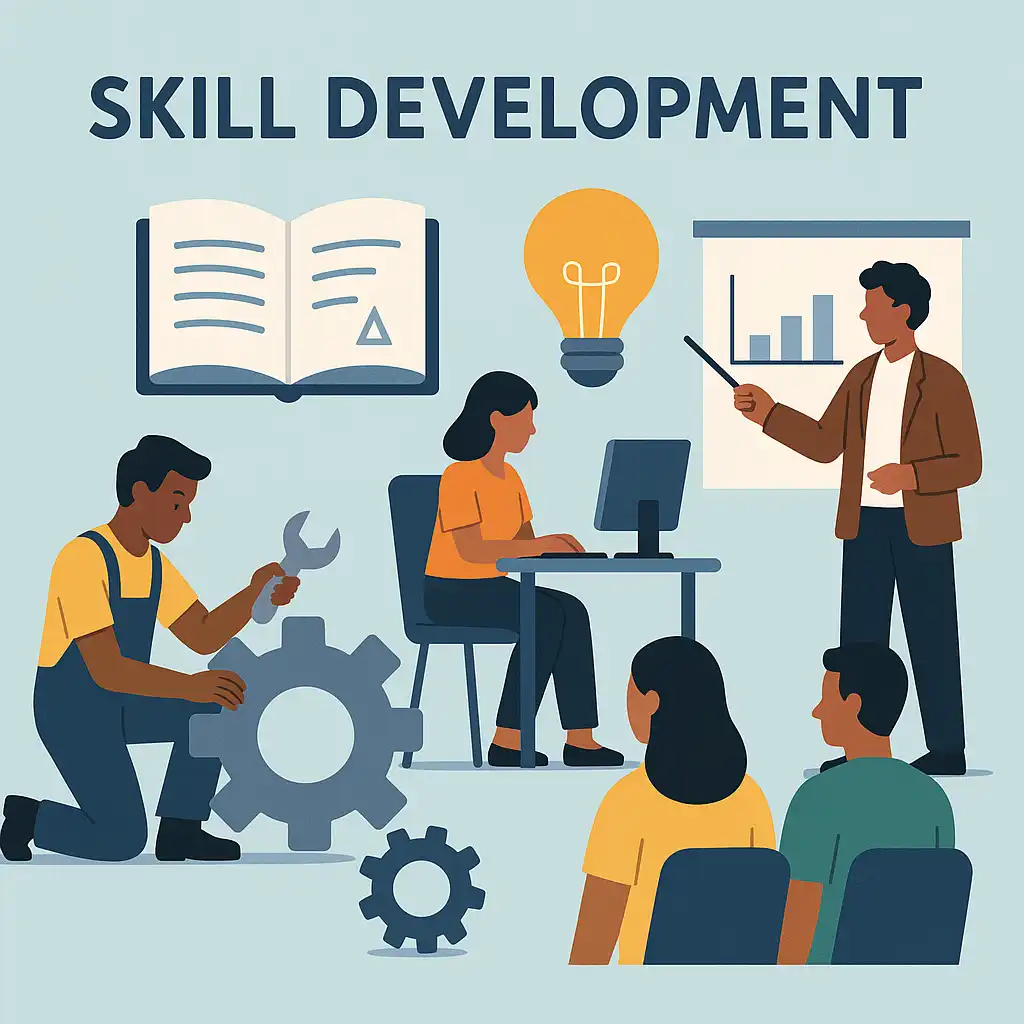What is Skill Development?
Skill development means improving or acquiring the abilities and knowledge needed to perform specific tasks or jobs. These skills could be anything from learning how to fix a machine, program a computer, or provide excellent customer service. In India, skill development is crucial because it helps people get better jobs, earn higher wages, and contribute to economic growth.

Why is Skill Development Important in India?
India is one of the largest and fastest-growing economies in the world, but it also faces challenges in ensuring that its population has the right skills for the jobs available. Here’s why skill development is so important:
- Youth Population:
- India has a young population—over 50% of its people are under the age of 25. This means there is a large workforce that needs to be equipped with skills to meet the demands of a growing economy.
- Changing Job Market:
- The job market is changing fast due to advances in technology, globalization, and new industries. Many of the traditional jobs are being replaced by new kinds of jobs that require different skills, such as those in IT, digital marketing, renewable energy, and advanced manufacturing.
- Economic Growth:
- Skill development is a key driver of economic growth. When people have the right skills, they can perform better in their jobs, leading to higher productivity and growth in industries, which ultimately benefits the whole economy.
- Employment Opportunities:
- Having the right skills helps people get better jobs. It increases their chances of finding work, reduces unemployment, and helps them earn higher wages.
The Skills Gap in India
Even though India has a large and growing workforce, there’s a skills gap—many people don’t have the skills that employers are looking for. This means there’s a mismatch between the skills people have and the skills needed for available jobs.
- Lack of Technical Skills: Many jobs require specific technical skills, such as in engineering, computing, or healthcare, but there are not enough trained workers.
- Soft Skills: Soft skills like communication, teamwork, and problem-solving are also important for success in many jobs. Not everyone has the opportunity to develop these skills.
- Rural vs Urban: There is also a big difference between skills available in urban areas and rural areas. People in rural areas may not have access to the same quality of education and training opportunities as those in cities.
Skill Development Programs in India
To address the skills gap and improve employment, the Indian government, along with private organizations, has launched several skill development programs. These programs are designed to train people in different skills that are in demand by employers.
- Pradhan Mantri Kaushal Vikas Yojana (PMKVY):
- This is the government’s flagship skill development program. It provides free training in various skills to youth, including manufacturing, service industries, and IT.
- After completing the training, individuals receive a certification that helps them get better job opportunities.
- National Skill Development Mission (NSDM):
- The NSDM aims to train millions of people in different skills across India. It provides funding for various skill development programs and works with different sectors, including agriculture, construction, healthcare, and electronics.
- Make in India:
- This initiative encourages businesses to create manufacturing jobs in India. It includes skill development in areas like automobiles, electronics, and textiles to ensure the workforce has the right skills for modern manufacturing jobs.
- Skill India Mission:
- This mission focuses on training youth in a variety of skills, particularly in the service sector (like hospitality, tourism, and retail). The aim is to improve employability and create job opportunities across industries.
- Online Courses and Platforms:
- Platforms like SWAYAM, NPTEL, and Skill India Portal offer online courses in a wide range of subjects. This allows people from remote areas or with limited access to training centers to learn new skills.
Key Sectors for Skill Development in India
India has specific industries that need workers with specialized skills. Some of the key sectors for skill development are:
- Information Technology (IT):
- With the rise of digital transformation, there is a high demand for software developers, data analysts, web designers, and IT specialists. Training in coding, programming languages, and cybersecurity is a big focus.
- Manufacturing and Engineering:
- The Make in India initiative aims to make India a global manufacturing hub. This requires skilled workers in areas like machinery operation, industrial automation, electronics, and robotics.
- Healthcare:
- There is a growing need for skilled workers in the healthcare sector, such as nurses, medical technicians, pharmacists, and doctors. India is also focusing on skill development for managing healthcare facilities and providing elderly care.
- Construction:
- India’s booming infrastructure needs a trained workforce in construction management, civil engineering, plumbing, electricians, and other related skills.
- Agriculture:
- Agri-tech is another important area for skill development. With India’s large agricultural sector, there’s a need for skills in modern farming techniques, sustainable agriculture, agriculture machinery, and crop management.
- Retail and Hospitality:
- With India’s growing retail and hospitality sectors, there is demand for salespeople, customer service representatives, and hospitality managers. Training is offered in areas like event management, tourism, and food services.
Challenges in Skill Development and Employment
While skill development is improving, there are still some challenges in India:
- Quality of Training:
- Not all skill development programs provide the quality of training needed to meet industry standards. Poor-quality training can lead to poor employability.
- Limited Access:
- Many people in rural or underdeveloped areas still do not have easy access to skill development programs. This limits their opportunities for gaining skills and finding jobs.
- Mismatch of Skills:
- Sometimes, the skills being taught do not match the demands of the job market. For example, there might be a lot of training in certain sectors, but not enough job openings in those fields.
- Gender Disparity:
- Women and girls often face challenges in accessing training and employment opportunities, especially in traditional or manual labor-based sectors. This limits their economic participation.
Skill Development for Employment: How It Helps
- Improved Employability:
- People with specific skills are more likely to find a job. Skilled workers can compete in a global job market and can earn better wages.
- Entrepreneurship:
- Skill development also helps individuals start their own businesses. With the right skills, people can set up their own ventures in fields like food services, manufacturing, or agriculture.
- Boost to the Economy:
- When workers are skilled, they become more productive, which boosts the overall economy. Companies can innovate, increase production, and compete internationally.
- Reduced Unemployment:
- Proper skill training increases job opportunities for everyone, helping to reduce unemployment rates. It ensures that the workforce is prepared to meet industry demands.
Conclusion
Skill development is essential for both individuals and the overall economy of India. It helps people get better jobs, earn higher wages, and improve their quality of life. For India to continue growing as an economic power, it must focus on providing high-quality skill development programs that meet the needs of the modern job market.
By addressing challenges like the skills gap, improving access to training, and ensuring that skills match industry needs, India can build a workforce that is employable, innovative, and competitive. This will not only help individuals but also boost India’s position in the global economy.
Keywords: Education, Skill development, Education & Personal Development, General Knowledge
Keywords: Education, Skill development, Education & Personal Development, General Knowledge


